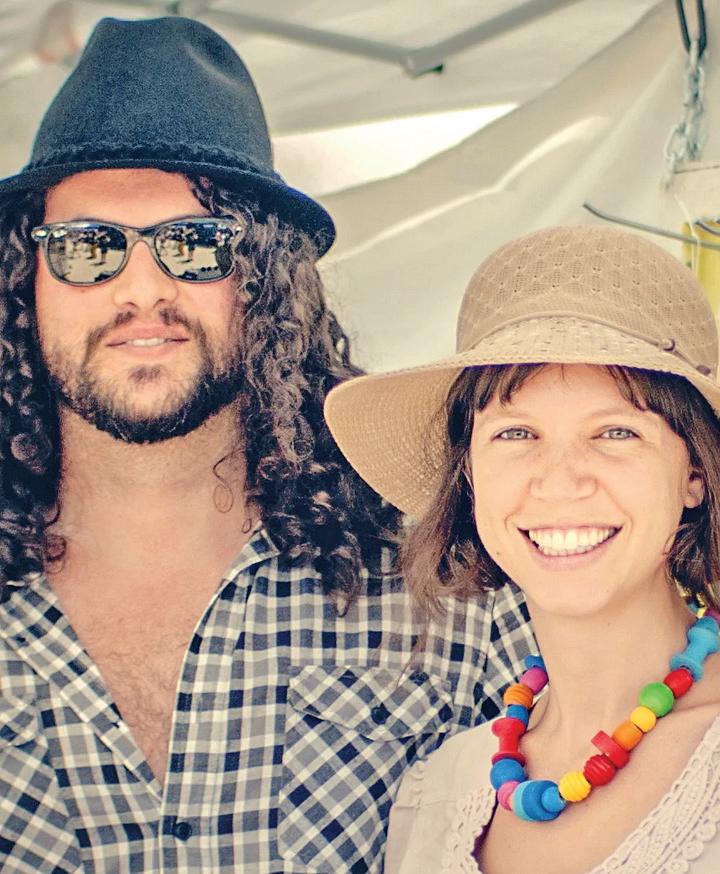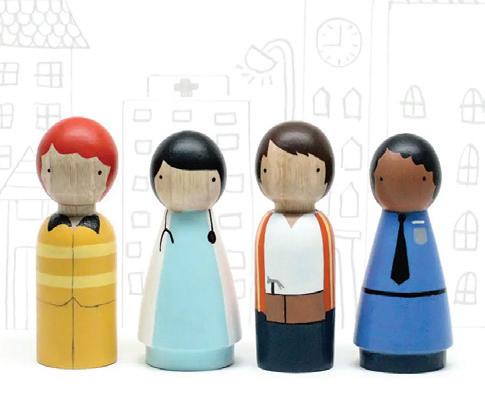
13 minute read
A Novel Perspective
Vicki Shurly, director of the Peninsula Community Library, spent years building a new library for the Old Mission Peninsula. Once it opened late last year, she planned a cruise vacation. Shurly never expected the library’s first year in it’s beautiful new space would go like this.
By Patrick Sullivan
As the pandemic descended upon Northern Michigan and changed all of our lives, Vicki Shurly, director of the Peninsula Community Library, was on the frontlines at the beginning, when on Traverse City’s Old Mission Peninsual, the virus turned from abstraction to reality, and at the next sea change, when places like libraries, shuttered for months, reopened.
In the beginning, Shurly and her husband had embarked on a cruise of the South Pacific that launched from Australia, a dream vacation that turned into a frightening odyssey. More recently, Shurly was tasked with reopening a critical institution on the Old Mission Peninsula and figuring out how to run a library in these new times.
Northern Express chatted with Shurly about her travels, her thoughts on reopening, and how she turned her South Seas misadventure into a must-read daily journal published in the Old Mission Gazette newsletter. Shurly is working on a book about her experience, which she is writing alongside Gazette editor, Jane Johnson Boursaw.
Northern Express: How it was that you were out of the country earlier this year just as the pandemic began?
Vicki Shurly: I had spent some three years on the library’s new building project [the library had been housed in the building occupied by the former, Old Mission Peninsula elementary school, and it was joyful. There was so much community support for the building. People from every walk of life helped, but it was intense. It consumed most of my life for three solid years, if you can imagine. And my husband, I don’t know when it was, probably October or November — we moved into the library September [2019] — he said, “We need to get away.” And he’s a bargain hunter and found this lovely cruise to places that we’d always wanted to see. It hit many south Polynesian islands, and we went ahead and booked it. It was scheduled for a little over three weeks beginning in the middle of February, and we were excited to just disappear from our normal world for a little while.
Express: Just before everything started to happen.
Shurly: Yeah. There were rumors of things going on. They were pretty much contained in Asia. The [virus] was in China, and we’d heard that it had spread to Japan, but there was no threat here. We had planned to fly into Hawaii and spend a few days there. While we were in Hawaii, we were told that certain
people would be screened, given whatever country they had been to before Hawaii. In fact, the flight from Hawaii to Sydney was delayed a little to allow for the screening, but we breezed through. It was just basic questions. No one took our temperature.
Express: You spent a couple days in Australia before leaving on the cruise. Was there much indication then that things were about to get weird?
Shurly: The night before the cruise, we were in a restaurant. For the first time, it kind of hit us that maybe this [virus] was bigger than we thought. A couple at the next table mentioned that Norwegian Cruise Line was refunding the cost of the cruise by 25 percent, and certain people wouldn’t be allowed. And they changed [our] itinerary a little.
Express: When did you realize that this was something that was going to change all of our lives?
Shurly: Not until we were on the ship and well into the cruise. It was probably about halfway through the cruise. Not even halfway. We went up the Australian coast — we didn’t set out for open sea until we hit Brisbane. We were headed toward New Caledonia, and the night before there was a letter on everyone’s bed, and [it stated that] if you were a national of Spain, Italy, or Germany, New Caledonia was not going to allow you off the ship.
It kind of hit us then that this had spread, that this was something more serious. It still didn’t hit us at that point that it had affected the United States yet. And there were disappointed people.
One man from Germany tried to slide through in front of us, which was the first time we realized what that little key card they give you on the ship means — it contains information like your country of origin, and usually it just chimes pleasantly, and you leave the ship, “Have a good day, be back by five.” His sounded an alarm, and there were security officers who told him he couldn’t leave the ship. I’d never seen anything like that before, and then he did back off, but I think that was our first realization that this wasn’t something that was contained.
Express: How did you come to start sending back journal entries about what was happening to the Old Mission Gazette?
Shurly: It wasn’t until after we started being denied ports. We disembarked at New Caledonia, went on to two ports in Fiji and Vanuatu, which is a very small Polynesian island, and we were supposed to be headed toward the French Polynesian Islands — Bora Bora and several other islands. And there was a night when everyone felt that the ship had turned around, and shortly afterward the captain came on and said that we had been denied entry into all of the French Polynesian islands. And our flight home was from Tahiti. That was when it hit us that this was something serious. We might not get home in the way we thought. It just kind of hit us that this was truly something that was going to affect everyone around the globe, and how are we going to get home? Are we going to get a flight?
Express: So then you were on odyssey to make it back to Old Mission from the South Pacific.
Shurly: We were. That’s a good way to put it. It was an odyssey. We were told at that point that Fiji would take us back; they had not had many cases, and they had already hosted us. We were, as far as anyone knew, a disease-free ship; we left before the pandemic. Anyone from Asia who had been in the affected countries was not allowed on the ship. We got partway to Fiji, and Suva, which is their largest city, said no. They redirected to us toward Lautoka, which is a smaller city, and assured us that there were flights to Hawaii and Sydney. But we never got to port; they changed their minds.
Then we headed toward New Zealand. New Zealand said they would take us as long as we went to a port far in the south. And we didn’t make it too far toward New Zealand before they closed their borders. And that night, I remember, that night was stressful. There was not panic on the ship, but you could tell among the staff and the passengers that there was some worry over how long we were going to be out in the South Pacific.
Express: I bet. Did they start running out of things?
Shurly: They did. They were very good about it. Fresh things disappeared. There was still a lot of food, but it was creative. There was a huge dish of what they call paella every night, and it was a mix of different things — rice and whatever meat they had. Lettuce disappeared. A lot of fresh fruits and vegetables disappeared. One morning a staff member — and the staff was incredible — but they did share that they had been told they could only have one protein a day. It started to get a little scary.
Of course, we didn’t end up in New Zealand. Rumors started flying. Rumors are always frightening because you don’t know what the truth is underneath. We were told we’re headed toward the Philippines; we’re headed towards South America. There’s a map in your cabin, and you can actually see where the boat is headed. We ended up in American Samoa and Pago Pago. They did not, to my knowledge, bring food onboard there. I’m not sure. It didn’t appear that they did, but they did allow the ship to refuel. There were police and bright lights on the ship all night, which was something I never experienced. You know, you become someone that no one wants.
Express: Yeah. Wow. But then you finally made it back home.
Shurly: We did. After we refueled in Pago Pago, a day or two later we were told Hawaii would accept us. We weren’t sure though until we ended up at port because the governor of Hawaii had promised his people that his borders were completely closed. Somewhere along the line, half of the propulsion system on our ship failed, and the governor decided that for humanitarian reasons, they had to take the ship in, and they did.
Express: That’s so lucky.
Shurly: We were. We had Coast Guard escort us into the harbor. It took several days. They had required Norwegian to come up with the plans to get people off the island. We were never allowed off the ship until we were ready to fly off. Norwegian arranged charter flights. There were 19 charter flights to major cities around the world. You had no choice; you had to go where they assigned you. And then of course, once you got off wherever you were headed, it was up to you to get home.
Express: And then you got back to Old Mission. What was the atmosphere like returning home compared to what it had been when you left?

Before moving to its new location at the intersection of Island View and Center roads, the Peninsula Community Library was housed inside the Old Mission Peninsula Elementary School. After Traverse City Area Public Schools (TCAPS) announced in October 2015 that the elementary was one of three in the district that would be closed, community members rallied. Some came forward to raise money to build a new library on 5+ acres of property the independent township library owned nearby; others raised funds to purchase the school property, and in September 2018, reopened it as a charter school, under Grand Valley State University’s charter.
Shurly: It was very much a shock. We had left a busy community. It was winter, but people still get out here. Now the roads were empty. There was no one on the roads. We weren’t sure about groceries. We actually stopped in Cadillac, at Walmart, to get groceries, because we went online and found out they were open. We just got basics. It was almost as though the world here had changed completely. People were sheltering at home. They weren’t coming out. We truly did not know what to expect. Our son had emailed us when we landed in Los Angeles and said nothing was on the grocery store shelves. We had some food at home but didn’t know how desperate it was going to get. It was an odd feeling to know that the world had changed so drastically.
Express: So, obviously, when you came home, the library had been closed — and closed indefinitely at that point.
Shurly: The library was closed. My staff had done a great job of closing, following all of the rules and regulations. However, I’m the business person behind the library. There were bills to pay. The board had decided to continue to pay the staff. There was payroll to run, federal and state payroll reports that still were due. So, I lived here alone for a while, and it was an eerie thing. I’ve been in the building alone before, but that was by choice. This was by law, and it just felt almost like the world was ending, at least the world as I knew it.
Express: Were you expecting the library would be able to open as early as it did, or were you expecting a longer haul?
Shurly: I actually had no idea. As the weeks went by, I thought we might be closed the entire summer. I was truly surprised that we were allowed to reopen in June. We opened in phases. We’re an independent township library, but we operate by contract with the Traverse Area District Library, Interlochen Public Library, and Fife Lake Public Library. And we met — the directors — several times and decided that regardless of the fact that we could have just opened at that point [May], we really were not ready. We needed to work out a plan to keep patrons and staff safe. We talked about how to do that. We talked about dates. In the first week back, we all just had staff get ready, to decide how to offer curbside service. [The library officially reopened to patrons on June 22.] It looks quite different in the library than it did before I left. Parents and grandparents love to come here. We have a huge toy selection. Kids will spend the day here, and that all had to go away. Upholstered furniture had to go away.
Express: In some ways, it feels right now like different people are living in different realities, and I imagine that might be even more apparent on the peninsula, where you’ve got the library open under such strict terms, and in the backdrop, you’ve got party buses that are going from winery to winery. How do you think reopening overall has gone so far?
Shurly: I’m a little leery of places of business just throwing open their doors. I think that there are many businesses here who have taken the same precautions that we have. We are tax-based funded; they have other economic decisions to make. I’m just mad when I see people in crowds on the beach or in businesses without masks. It is a law. We’ve required it here. And I have to say, almost everyone who has come through our doors has abided by it without being told. I did have one issue, a tourist from downstate, who challenged me on whose law it was. I told him we weren’t going to go there and managed to diffuse the situation. But I don’t know what the future holds for the library. I worry a little as businesses open quickly, that we will have a resurgence, that the library, which serves a huge need out here, will possibly be closed.
Express: So, would you go on a cruise again? And if so, when do you imagine that would be?
Shurly: [laughs] We would. You know, it was something that could have happened anywhere. We could have traveled in a more traditional manner. We could have flown to Spain or Italy or London and had been stuck there. People were kind; people were understanding. We never felt in danger. I think the biggest issue for us was the despondency of not knowing when we would see our family again, or our home, or Old Mission. So, we would absolutely travel again, but not until this is all over.



Juan Carlos and Anna Leigh Donado’s Goose Grease dolls are made to last a lifetime. Each is carefully hand-chiseled on an electric lathe in a small carpentry shop in Bogotá, Colombia, using sustainably forested wood.
“Goose Grease is a fair trade business that trains and employs skilled artisans to hand-paint each peg with non-toxic water-based materials, making them perfect for kids of all ages.”

In The Village at Grand Traverse Commons 231.932.0775 | sanctuarytc.com
Make your reservations now for a glass of wine on one of our beautiful patios, a delicious multi-course wine dinner served overlooking the vineyard, or our live Thursday night music lineup!


Reservations are available online now at shop.chateauchantal.com/reservation-events











